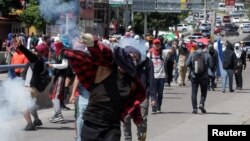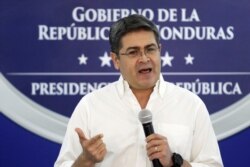Protests calling for the exit of President Juan Orlando Hernandez turned violent Thursday as Honduran police used tear gas to disperse hundreds of demonstrators in the capital.
Protesters blocked roads with burning tires. Windows were broken in downtown businesses.
Government critics have been emboldened by the conviction of Hernandez's younger brother on drug trafficking charges in a New York court this month after a trial during which witnesses implicated the president in the drug enterprise.
The president has strongly denied the claims, which included drug traffickers testifying that they gave $1.5 million to Hernandez's various political campaigns in exchange for protection from security forces.
Salvador Nasralla, a television personality who finished second to Hernandez in the last election, leads a coalition calling for the president to step down. They have promised civil disobedience until Hernandez is gone and threatened a national strike, but haven't set a date.
Political analyst Raul Pineda, a former lawmaker from Hernandez's National party, said Thursday that Honduras "requires urgent changes."
Pineda sees three options for Hernandez to calm the situation: rectify his behavior, open a genuine dialogue with the opposition or resign.
"If Hernandez doesn't go voluntarily there will be a lot of violence in the streets and Honduras will fall into a terrible total chaos," Pineda said.
Retired Gen. Romeo Vasquez, who was involved in the removal of President Manuel Zelaya in 2009 before embarking on a political career, said Honduran institutions are not working.
"That's why it's time to change the country's direction," he said.
Honduras' Channel 5, an outlet that has traditionally backed the government line, saw one of its most recognized personalities, Renato Alvarez, say on air Thursday that "the path to social peace passes through the president's resignation."

